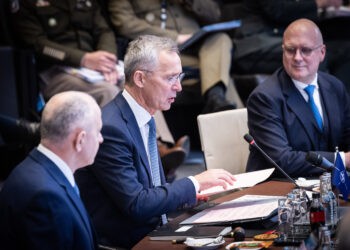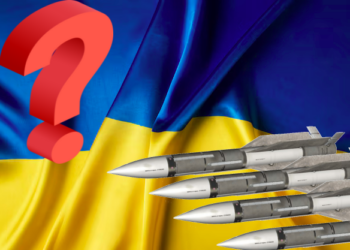Brussels – The European Union’s support is not in question; it is “unwavering” and the heads of state and government want to reiterate it at the extraordinary summit. They put it in black and white in the meeting conclusions to send a signal to Russian President Vladimir Putin and to try to reassure as much as possible Ukraine’s President Volodymr Zelensky, who is calling for a change of pace and more decisiveness. But the leaders of the 27 Member States, as was the case at the European Council a month ago, make vague commitments. They acknowledge “the need for urgent provision of anti-air defense” without indicating when or how.
A signal, no doubt, but certainly not the kind of response Zelensky expected. He, the Ukrainian president, once again participated by video link in the meeting of EU heads of state and government. To them, he points out how “in Ukraine, in our part of Europe, unfortunately, we don’t have the level of defense that we all saw in the Middle East a few days ago,” referring to the massive attack launched by Iran against Israel. “Our Ukrainian skies and the skies of our neighbors deserve the same security,” Zelensky emphasizes, making an explicit call for Europe to do all it can and provide the appropriate means and technologies.
The leaders call on the responsible ministers to take up the dossier, to “follow up” on the warring partner’s demands and the EU’s green light in principle to intervene in support of Ukraine. Work needs to be done “particularly in the upcoming meetings,” which means starting right away, as early as Monday (April 22), when the foreign and defense ministers of the 27 Member States will meet in Luxembourg to discuss precisely the Russian-Ukrainian conflict. It needs to be done soon, and the European Union is trying to speed things up, as Zelensky has called for.
The president of Ukraine needs virtually everything. “Arms for our soldiers. Artillery shells. Vehicles. Drones.” The list presented to the 27 includes “everything that helps keep the front line” and not retreat. Anti-aircraft systems are needed, but the government in Kyiv is asking for what is needed not only not to capitulate but what it requires to repel the aggressor. “Putin hopes to succeed in his counteroffensive, and the only thing that can eradicate this hope is the shortage of weapons among our soldiers.” Weapons that are beginning to run out. “Unfortunately, we have not yet seen the millions of artillery shells from the European Union that have been talked about so much,” Zelensky criticizes. The EU continues to lag behind, but that’s nothing new. What worries Kyiv is the inability to catch up and reduce the backlog. “In addition, some other initiatives have not yet been fully implemented,” Zelensky adds.
The EU tries to live up to its commitments as best it can. The conclusions of the extraordinary summit contain a commitment to “accelerate and intensify the delivery of all necessary military assistance, including artillery and ammunition.” The same commitment of a month ago at the last European Council summit. While continuing to repeat the same concept, the sign is that little has changed. In an EU that cannot provide for its own security and an industrial base that has to be reinvented, it is hard to see how and when this can be realized. Not least because defense remains exquisitely a national matter, and the 27 Member States are struggling to find a European dimension.
“Military support and commitment to security will be provided in full compliance with the security and defense policy of specific member states and taking into account the security and defense interests of all member states”. Even this passage, identical to a month ago, indicates that little has changed since then. The European contribution will be voluntary, perhaps coordinated among someone in the twelve-star club, but all left to the test of facts.
Zelensky takes to Brussels the explicit request to “accelerate the implementation of our agreements with you, both on supplies and joint production of arms and ammunition, and on the financing of relevant projects.” The conclusions are fine in principle but not in substance. Ukraine does not intend to lose the war, but all that comes from Brussels is a statement that has yet to be translated into practice.
![Il presidente del Consiglio europeo, Charles Michel, discute con il presidente ucraino Volodimyr Zelensky, collegato in video. [Bruxelles, 17 aprile 2024. Foto: European Council]](https://staging.eunews.it/wp-content/uploads/2024/04/zelensky-240417-750x375.jpg)
![Un momento del Summit europeo della difesa [Bruxelles, 17 aprile 2024]](https://staging.eunews.it/wp-content/uploads/2024/04/WhatsApp-Image-2024-04-17-at-12.46.20-350x250.jpeg)


![Il presidente dell'Ucraina, Volodymir Zelensky, collegato in videoconferenza con i capi di Stato e di governo dell'Ue [Bruxelles, 21 marzo 2024. Foto: European Council]](https://staging.eunews.it/wp-content/uploads/2024/03/zelensky-240321-350x250.jpg)




